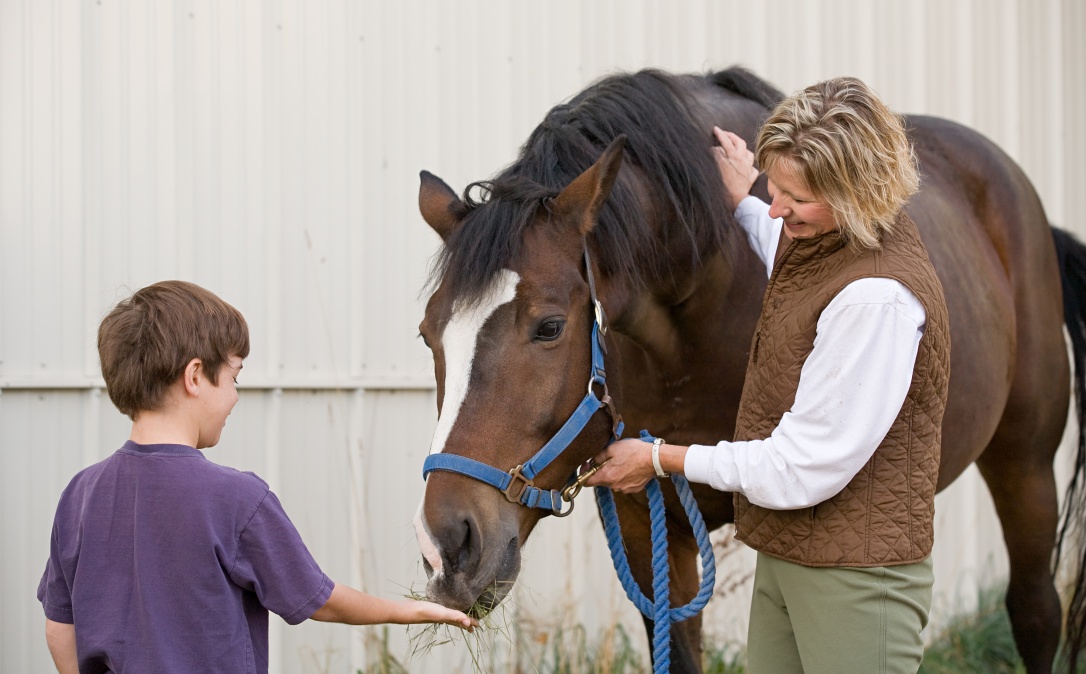
Today, about half a million families own one to three horses and thousands more say they would like to own horses but don’t feel like it would be practical or affordable. Horses are not cheap to purchase, with pedigrees costing well into the thousands and even unregistered grade ponies costing several hundred. Yet ask anyone who has ever owned a horse and they will tell you that the cheapest part of owning a horse is purchasing it. Aside from the general upkeep, such as feeding and watering, horse owners must also face the expenses of having their horse’s hooves taken care of, regular medical checkups and immunizations, grooming supplies, tack, and all the fun stuff like show entry fees and your own riding attire. If you are lucky enough to forgo the added expense of boarding fees by keeping your horse(s) on your own property, you still must incur the expense of bedding and stable maintenance. By no means is horsekeeping cheap, but with a few careful considerations and a bit of creative planning, you could at least make it more affordable, even lucrative.
Own or Lease
Do you really want to own your own horse, or would leasing one be a better idea? If you really think you want a horse, ask yourself why. If the most desirable part of owning a horse is simply being able to ride one whenever you want, leasing may be a better option. There are many horse owners out there looking for riders to lease their horses, either full-time or for just a few hours each week. All lease agreements will differ slightly, but most will give you the majority of the “fun” benefits of horse ownership without the added responsibility and extra expenses. Most of the time, when you pay a lease fee and sign a lease agreement, you will be able to go and visit your horse and ride it any time you’ve agreed on. Some lease horses may have several lease riders who share the horse in a sort of “timeshare” fashion, while other agreements may have you as the solitary rider and caretaker of the horse. Agreements will also differ on who is to be responsible for buying feed and cleaning the stalls, but most agreements will at least leave the lease rider free from any burden should the horse become ill or injured within the parameters of the agreement. If you do decide to lease a horse, look over the agreement carefully before signing and consider having an attorney review the details as well.
If, on the other hand, the riding part of owning a horse is only a small benefit to the desire to take care of and train or raise your own horse, then may ownership is in your cards.
Gaining Experience
Before you do begin to go shopping for a horse, you should carefully consider whether or not you have adequate experience. If you are a beginner with horses and have only had minimal or no experience at all, you should try to gain some first. Again, this is where leasing a horse for a short period may come in handy. You may also want to consider volunteering at a horse rescue and taking riding lessons from a reputable hands-on riding instructor. You don’t want a riding instructor who is just going to present you with your horse each session to only ride, but one who will teach you from the ground up how to handle a horse, how to behave around one, possibly how to troubleshoot any problems your horse is showing, and then also how to safely ride one.
Board or Keep at Home?
So now that you’ve decided that you definitely want to buy your own horse and you have gained the proper experience, where will you keep him? If you plan on keeping him at home, make sure you know what your city or township’s zoning regulations are. Most communities require a certain amount of land in order to keep a horse and some will also require an additional amount of land between your horse pasture and neighbors’ properties. Meanwhile, some communities don’t allow any horses at all. After you have checked with your local zoning department, your next stop should be with your local animal welfare agency to ask them for any requirements that they may have considering housing and enclosures. Every region may be different, so don’t only rely on internet information, but actually go visit or make direct phone calls to find out exactly what you need in order to keep your horse legally and safely. At the very least, every horse needs food, fresh water, and shelter from the sun and poor weather. If you live in an area that gets very hot, you may want to consider adding a ventilation or cooling system to your horse’s barn, and if your area gets really chilly winters, you might want to heat your barn to keep your horse warm.
If this all sounds like too much to deal with, then maybe owning a horse is not right for you or your family. Horse ownership is not for everyone, though everyone can gain at least some benefit from being around horses. Get your hands dirty and gain some experience first, talk to other horse owners, and seriously think about your lifestyle and whether or not a horse would be a good fit. Horses can bond very quickly with their owners and having to switch owners can be very stressful on them. Whatever you decide, you don’t want to put the cart before the horse.
